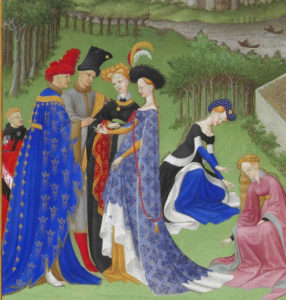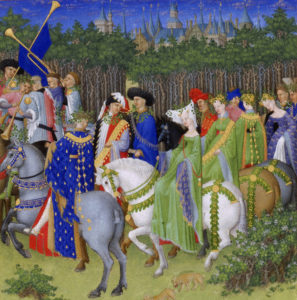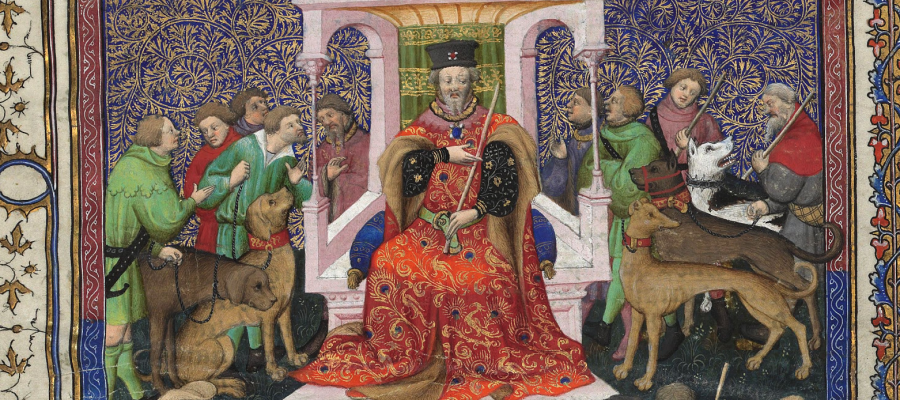*My working definition of nobility is that of a titled peer (Baron, Earl, Duke etc) in Late Medieval England, as opposed to the ‘gentry’ which made up the rest of the upper class but held no such titles. This definition is not universal to all of Western Medieval Europe, and may be analogous to what other locales refer to as ‘upper vs lower nobility,’ so please keep that in mind as you read, but the sentiment remains the same regardless of the labels.
This grew out of an old discussion that arose in the planning stages of an event I attended, but I thought the ideas brought up there could benefit a larger audience. I primarily do living history as a vehicle for public education, so keep that in mind when reading my philosophy. I would be lying if I said I didn’t do it because it’s fun on a personal level, but the majority of the events I attend are focused on interacting with and educating the lay public about life and material culture in the Middle Ages. A lot of newcomers and even many veterans to living history and re-enactment set out to develop a noble impression, but is this really for the best? If historical accuracy is a serious concern, and especially if you do this with public education in mind, it may not be. I think a lot of people discount lower gentry and commons impressions as somehow not as cool or interesting to do while simultaneously underestimating the material culture that comes with being part of the Medieval upper crust. Presently, my personal impression is actually that of an esquire, not a knight, definitely not nobility, and I often feel that I’m barely able to keep my head above water with my chosen status. I’m not out to ruin anyone’s fun, but I ask that you read with an open mind and consider some of the points laid out here.
 I think a lot of people misuse the term nobility and may not fully appreciate what it entails. The term noble comes with a deep set of implications. In late Medieval England, this means you are a titled peer, like a Baron, Earl or Duke. You have a seat in the House of Lords. You are in general obscenely wealthy compared to the remainder of the populace, and by some measures the rest of the upper class as well. There are of course exceptions to this where some wealthy individuals could draw more income than their titled social superiors, but they are just that, exceptions. People were very aware of social status during the Middle Ages. Even a non-noble knight had a lot more to show for their wealth than a nice plate harness, which is often where the planning stage of a new living history impression stops. I think the allure of portraying nobility sounds very seductive and people get drawn in to the idea of wanting to do a noble impression without considering the scope of such an impression. At the end of the day though, can any of us really pull it off? Demonstrating the enormous material wealth of an actual Medieval noble requires more than a heraldic cote armor to be convincing. It probably requires that the real life person doing the portrayal also be wealthy themselves in order to be able to afford the accouterments necessary to effectively demonstrate the types of things a real nobleman or noblewoman would have.
I think a lot of people misuse the term nobility and may not fully appreciate what it entails. The term noble comes with a deep set of implications. In late Medieval England, this means you are a titled peer, like a Baron, Earl or Duke. You have a seat in the House of Lords. You are in general obscenely wealthy compared to the remainder of the populace, and by some measures the rest of the upper class as well. There are of course exceptions to this where some wealthy individuals could draw more income than their titled social superiors, but they are just that, exceptions. People were very aware of social status during the Middle Ages. Even a non-noble knight had a lot more to show for their wealth than a nice plate harness, which is often where the planning stage of a new living history impression stops. I think the allure of portraying nobility sounds very seductive and people get drawn in to the idea of wanting to do a noble impression without considering the scope of such an impression. At the end of the day though, can any of us really pull it off? Demonstrating the enormous material wealth of an actual Medieval noble requires more than a heraldic cote armor to be convincing. It probably requires that the real life person doing the portrayal also be wealthy themselves in order to be able to afford the accouterments necessary to effectively demonstrate the types of things a real nobleman or noblewoman would have.
All living history as we present it requires a degree of suspension of disbelief. Obviously we are not who we are portraying and our attempt to represent our medieval counterparts falls short in countless ways. We can easily wind up getting too deep in the weeds and arrive at the conclusion that virtually any impression is just an exercise in futility, so why have any limitations at all? This nihilistic line of reasoning isn’t the most constructive approach however, and it begins to lose the forest for the trees. A lot of it is dependent on what we’re willing or able to display. Are we just displaying our person? Are we displaying our personal arming pavilion? Are we displaying our entire camp? Are we trying to do this by ourselves or are we operating with a group? Each of these expounds on the previous level of presentation and should have with it the material culture that matches the overall display to the best of our abilities. Is it better to poorly portray a Duke or really nail the impression of a Gentleman man-at-arms? Is the public better off after seeing a ‘Baron’ whose clothes are indistinguishable from a serf, or a really well thought out and accessorized Yeoman Archer? The danger of chasing that noble impression is that it can leave the re-enactor drowning in the overwhelming reality that they just can’t produce the overall effect of their chosen social status.
 Things can get out of hand really quickly when you start to consider all of the objects that would be required to portray a convincing Earl; some of those things probably include manor houses, servants, gilded arse-girdles, sterling silver chamber pots, a different breed of horse for all of your different needs, a company of men-at-arms, a few retained knights etc… You can keep adding to the list, ad infinitum, to no real constructive ends. We all have limitations in the breadth of what we are able to portray as re-enactors. Some of those things might be within people’s reach, but for most of us they are not, and never will be. Fretting over the things that are realistically out of our control and beyond the scope of what we do is not that helpful.
Things can get out of hand really quickly when you start to consider all of the objects that would be required to portray a convincing Earl; some of those things probably include manor houses, servants, gilded arse-girdles, sterling silver chamber pots, a different breed of horse for all of your different needs, a company of men-at-arms, a few retained knights etc… You can keep adding to the list, ad infinitum, to no real constructive ends. We all have limitations in the breadth of what we are able to portray as re-enactors. Some of those things might be within people’s reach, but for most of us they are not, and never will be. Fretting over the things that are realistically out of our control and beyond the scope of what we do is not that helpful.
The most immediate things that we do have direct control over are our person, our person’s immediate objects and accessories, our camps, and less tangibly our knowledge-base. We have a lot of control over making those items commensurate with a more or less convincing portrayal of some social status. These things include cuts of clothing, choice of materials, decoration on armor, types of furniture, styles of flatware and drinking vessels, clothing accessories etc. Remember, that knightly portrayal has to come out of armor at some point, and it doesn’t make contextual sense if your clothing doesn’t exude the social status of knighthood. In order to pull off an impression, we should be intellectually honest with ourselves, and carefully consider whether or not the level of material culture we are able to produce is commensurate with the station we envision for our impressions.
Our knowledge base is also important and something that often gets lost in our desire to acquire new stuff. Sometimes we get so focused on whether or not this brocade pattern is appropriate or whether we can document that style of belt mount that we end up neglecting the things important to an impression that we cannot touch. Is the re-enactor prepared to address national politics on a detailed level as a Duke should easily be able to do? It might be easier to address the immediacy of your lance of men-at-arms and archers on campaign because that is the concern of a lower tier knight. I know as an ‘esquire’ I’m a lot more comfortable spontaneously talking about my arms, armor, and the people in my company than things of considerably larger scope.
What about the rest of the gentry? The majority of the upper class, knights, esquires and wealthy townsmen are not nobles and are every bit as interesting from a living history perspective. A wealthy knight with his own estate, servants, and men-at-arms is often not a noble. He’s still wealthy compared to the villeins and farmers working his land and most everyone else in society. I don’t think it’s any less valid to portray a gentleman who is not part of the nobility. If doing an upper class impression is important to you, might it be more within our grasp as living historians to accurately pull off a non-noble gentry portrayal than just claiming the title of nobility without the objects to back it up? I’m willing to bet that many of the reasons why a person thinks they should do a noble impression in the first place includes a lot of the things that are still available to the person portraying the rest of the gentry and much easier to attain for the majority of us who do this on a non-noble budget.
I’m not out to offend anyone, but I think sometimes a little personal desire can get involved in our decisions. It’s fun to think of ourselves as nobility or royalty whether we can pull it off or not; after all this is supposed to be fun isn’t it? Why can’t I be who I want to be? On some level, this is just a fantasy role play, is it not? I think living history as a whole is best served by striving to be as accurate as possible in our impressions especially when we use this as a means to educate the public. Of course none of us will ever be 100% accurate and we must all do what we can and what we are willing. To even portray a landed esquire you should have servants and horses and maybe even a manor and all kinds of stuff none of us are going to have, but that’s beyond the scope of what I’m suggesting. What we can control is our individual impressions and for the most part our camp settings. That being said, I think we should do our best to align our means and our goals with our portrayals as a guiding philosophy in our approach to Living History. Take this for what you will, I’m not out to ruin anyone’s good time, but I hope that you’ll consider it as food for thought at the very least.
At the end of the day we’re trying to sell an impression as authentically as we can. We have to temper our personal desires with what we can realistically represent and we must be intellectually honest with ourselves. Otherwise, we risk losing the point of what we’re doing, and we won’t be better for it and neither will the public.






4 Comments
Leave your reply.